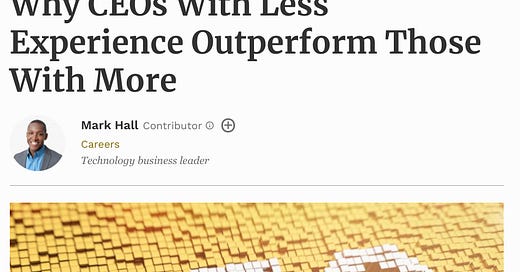New Study: More Experienced CEOs Underperform Compared To Rookie CEOs
There Are Surprising And Obvious Reasons Why
A recent study published in Harvard Business Review (HBR) revealed something extremely interesting and counter-intuitive: CEOs with less experience do better than those with more experience.
Let that sink for a minute. The idea that rookie CEOs outperform more experienced ones, despite the perception that successful executives enjoy a revolving door throughout their career, surprised me a little.
What’s your initial impression of this finding?
The research, compiled by an executive recruiting firm, involved an analysis of 855 CEOs across companies listed on the S&P 500. It considered the stock performance of companies under those CEOs in the medium and long-term. The firm also interviewed boards of directors, who are often responsible for selecting the executives who occupy the top seat.
After I dug into the data, I felt compelled to share it in a recent Forbes article. Here is a brief excerpt from my piece:
Executives who held the role for the first time achieved a higher market-adjusted return for their company’s shareholders compared to more experienced ones. Further, the stock prices of their companies experienced less volatility.
For CEOs who held the role in back-to-back companies, an estimated 70% found more success in their first capacity as a senior leader compared to their second. For more than half of those studied, the second go-round as CEO led to results that were lower than the overall stock market.
…
There are a few reasons why this is happening. According to the Spencer Stuart research team, experienced CEOs rely heavily on the old way of doing things, with processes and playbooks that worked in prior organizations. As would be expected, this led to an increased focus on reducing costs...
With all that said, there was another clear point cited in the study that partially explains why experienced CEOs are sometimes lagging on performance. They are often brought into the position and company when the organization is already struggling or facing steep challenges and needs a turnaround.
After you dive into the analysis, I would be interested in hearing what surprised you and what didn’t. If you are interested in seeing the HBR article with the initial study data, it can be found here.





I wonder what the reaction is about this from experienced CEOs!?